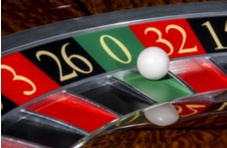After a Canadian couple got scammed in a no deposit casino bonus scam game of “progressive roulette,” authorities are warning online casino and land-based players around the world to play only at regulated land-based and online casino sites - like here, at Springbok.
The scam came to light after a Canadian couple traveled to the Dominican Republic to play at a casino at the Hotel Riu Bambu resort near Punta Cana. They were lured into a “progressive roulette” game which looked innocent enough. But, in a situation in which a recognized hotel is seemingly behind the casino that is featuring the game – or, at the very least, does nothing to control the casino’s scam – unwitting travelers may end up losing thousands of dollars.
In the incident at the Hotel Riu Bambu, the couple in question had no worries about the casino because it was attached to a recognized hotel – one with good ratings and reviews. The casino, which operates on the hotel’s premises, was able to cause them to lose thousands of dollars at the progressive roulette game and then to force the couple to pay up before they would release them from the casino site.
Scam Process
Jay Lush and Steve Bungay traveled from Newfoundland to the Dominican Republic recently to enjoy some casino entertainment. When they entered the casino, Bungay and Lush were greeted by a hostess who handed them $25 in complimentary chips, to be applied to the “progressive roulette” game. Progressive roulette basically involves players throwing eight balls into a spinning wheel. Each ball falls into a different numbered slot.
After the dealer adds up the values of each ball, the player receives his total score. Every spin is a different score and each score has a different result assigned to it on a table chart. Some scores are positive and some are negative. The goal is to reach a certain score to win a jackpot.
The game moves so quickly that the player doesn’t have time to take in the rules.
Frequently, a player will find himself in a situation in which it appears that he is just a few points off a big win. It’s all illusory since each spin costs money. The player will often find the jackpot has suddenly doubled and will get excited, because it sounds great. It really isn’t though since the jackpot may expand but the player’s score doesn’t. That means, essentially, that the goalposts have just been moved much further away.
The casino strong-armed the couple to withdraw money from the ATM in $200 increments. When the banks froze their cards, the casino staff demanded that they call the bank to request that the bank wire the money. Bungay’s driving license, which he had provided to the casino as an ID, was held until the pair complied with the demands.
Bungay and Lush complained to the hotel but the casino refused to take any responsibility, telling the couple that the casino was a separate, privately run enterprise.
On-Going Scam
Bungay and Lush aren’t the only ones to fall prey to the “progressive roulette” scam. Observers say that the scam has been in operation for years in casinos throughout the Caribbean.
The game is also known as “Jackpot Roulette” or Razzle Dazzle. It’s a common carnival game scam that has been around for many years.
Unregulated casinos tend to use roulette wheels to get the numbers but other scammers create the scam in different ways. However, the the principle is always the same. The game is virtually impossible for a player to win. This is due to the way that the sums add up asymmetrically in the house favor. Basically, there are many more losing combinations and sequences than winning sequences and combinations.
With no cheating the house edge is close to 100%. The scam is that, in the early part of the game, the dealer deliberately miscounts the sums, so that the sums favor the player. In that way the player thinks that it’s an easy game to win and he gets over confident as he racks up points.
The dealer scoops up the balls quickly and adds up the sums, so the player doesn’t realize that it’s all fake. As the player gets closer and closer to the prize, the dealer simply stops miscalculating and the sums reflect the actual, impossible to win numbers. At that point, the player isn’t accumulating points but already has so much invested in the game that he doesn’t want to stop placing bets. The bets continue, the game continues and now the losses start to add up.




